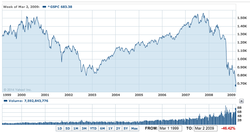 Gallup Poll (click to enlarge)
Gallup Poll (click to enlarge) At SSWM, you know we are fascinated with human behavior. Our charts, over the next few weeks, will focus directly on the influence that emotions have on individual investing. In this segment, we look at our obsession with asset classes that may not be the best decision long term.
Real Estate and Gold continue to be the most popular asset classes for the best long-term investment. Real estate, making another comeback since the melt down, is the most popular choice in a recent Gallup poll. Picked by 30% of respondents, up from 19% in 2011. Gold was the second choice. 24% chose the precious metal, down from 34% in 2011. The tumultuous S&P 500, with its volatility and whispering about being overvalued, was even with gold in the poll at 24%.
Real Estate and Gold continue to be the most popular asset classes for the best long-term investment. Real estate, making another comeback since the melt down, is the most popular choice in a recent Gallup poll. Picked by 30% of respondents, up from 19% in 2011. Gold was the second choice. 24% chose the precious metal, down from 34% in 2011. The tumultuous S&P 500, with its volatility and whispering about being overvalued, was even with gold in the poll at 24%.
 S&P 500 (click to enlarge)
S&P 500 (click to enlarge) If we review the period from 1999 to 2009, it is easy to see why investors may be skeptical of stocks. This was ten years that resulted in a negative return of almost 50%. While you can track your investments 'real-time' in trackers and tools, they are very much ephemeral, mostly paper and numbers on a statement or spreadsheet. Gold is heavy, shimmering and can be stacked in a vault. Real estate can be viewed, walked in/on, and lived in. Touch, hold and hang on to versus a number on a ticker. Emotion seems to side with real estate and gold when it comes to leniency on asset class performance.
 S&P versus Gold (click to enlarge)
S&P versus Gold (click to enlarge) Reviewing data over the past 25 years shows that picking these two asset classes just does not make sense. During the period, from 1988 to 2013, gold returned 1.6%, real estate 3.4%, the S&P 500 returned 7.9%.
While we won't argue, and SSWM does, that keeping a small percentage of gold in your portfolio does make some sense, it is easily disputed. During the financial crisis, when stocks took a dramatic 22% drop in Q4 2008, gold manage to stay stable and fell only 1%. Those looking to hedge the market, found refuge in the metal. A better place to run may have been Treasury bonds that gained 14.8% during the same period. Last year [2013] was terrible for gold investors, values dropped 28%. Gold profits come, only, when others show interests in buying.
While we won't argue, and SSWM does, that keeping a small percentage of gold in your portfolio does make some sense, it is easily disputed. During the financial crisis, when stocks took a dramatic 22% drop in Q4 2008, gold manage to stay stable and fell only 1%. Those looking to hedge the market, found refuge in the metal. A better place to run may have been Treasury bonds that gained 14.8% during the same period. Last year [2013] was terrible for gold investors, values dropped 28%. Gold profits come, only, when others show interests in buying.
 (click to enlarge)
(click to enlarge) Of interest, is that the less affluent the investor/household, the more likely they are to make gold their primary investment. It has to be a matter of perception or is it because those with less earning power lack the skills and education necessary to perform the analysis. Do they distrust the system? Fear plays a huge role in behavioral finance and the perceived hedge against market/economic fear is that gold is a safe haven, regardless of long-term performance.
 (click to enlarge)
(click to enlarge) Real estate is a very odd animal. What is the true value of real estate to the owner? When you enter into home ownership, you are hopefully gaining on the margin between your mortgage payment and what you would have otherwise paid to lease or rent. You anticipate that your investment will increase in value over time. Ownership also has tax benefits. What I do find interesting is 'ownership' to me means you own it outright. I view a mortgage as a modified lease arrangement.
It's not the 1950s anymore. Today's real estate is viewed much differently. We no longer enter into the real estate transaction with a reasonable down-payment and a sensible mortgage that we intend to pay off over our lifetime. We now have terms in our vernacular such as: balloon payment, subprime, adjustable rate, derivatives, credit default swaps, mortgage back securities, and flipping. It has only been over the last 10 to 15 years that we have begun to treat our homes like any other asset. No longer do we view home ownership as a fairly illiquid asset that makes up the majority of our net worth.
It's not the 1950s anymore. Today's real estate is viewed much differently. We no longer enter into the real estate transaction with a reasonable down-payment and a sensible mortgage that we intend to pay off over our lifetime. We now have terms in our vernacular such as: balloon payment, subprime, adjustable rate, derivatives, credit default swaps, mortgage back securities, and flipping. It has only been over the last 10 to 15 years that we have begun to treat our homes like any other asset. No longer do we view home ownership as a fairly illiquid asset that makes up the majority of our net worth.

Research, analysis, and all the data we review shows that stocks are the best long term investment. Home ownership should be viewed as a place to live, to raise a family. It will be necessary to buy and sell when circumstances dictate. Job change or family size changes. In recent years, homes have become a personal ATM. Taking out home equity loans to pay off credit card debt, or to renovate in ways that do not add value to the property. A home, once viewed as an asset, can quickly become a nightmare and a negative equity handcuff.
Investor behavior is fascinating. At SSWM we are bullish on stocks. Despite the risk, the returns over the last 25 years have been double those of real estate and more than four times those of gold. Equity offers a good degree of liquidity over other assets. Stocks offer a wide range of investment options, from conservative to extremely aggressive.
Where are you putting your money, what do you feel is the best asset class for you? Sua Sponte.
Bradford C. Bruner for Sua Sponte Wealth Management
Investor behavior is fascinating. At SSWM we are bullish on stocks. Despite the risk, the returns over the last 25 years have been double those of real estate and more than four times those of gold. Equity offers a good degree of liquidity over other assets. Stocks offer a wide range of investment options, from conservative to extremely aggressive.
Where are you putting your money, what do you feel is the best asset class for you? Sua Sponte.
Bradford C. Bruner for Sua Sponte Wealth Management

















































